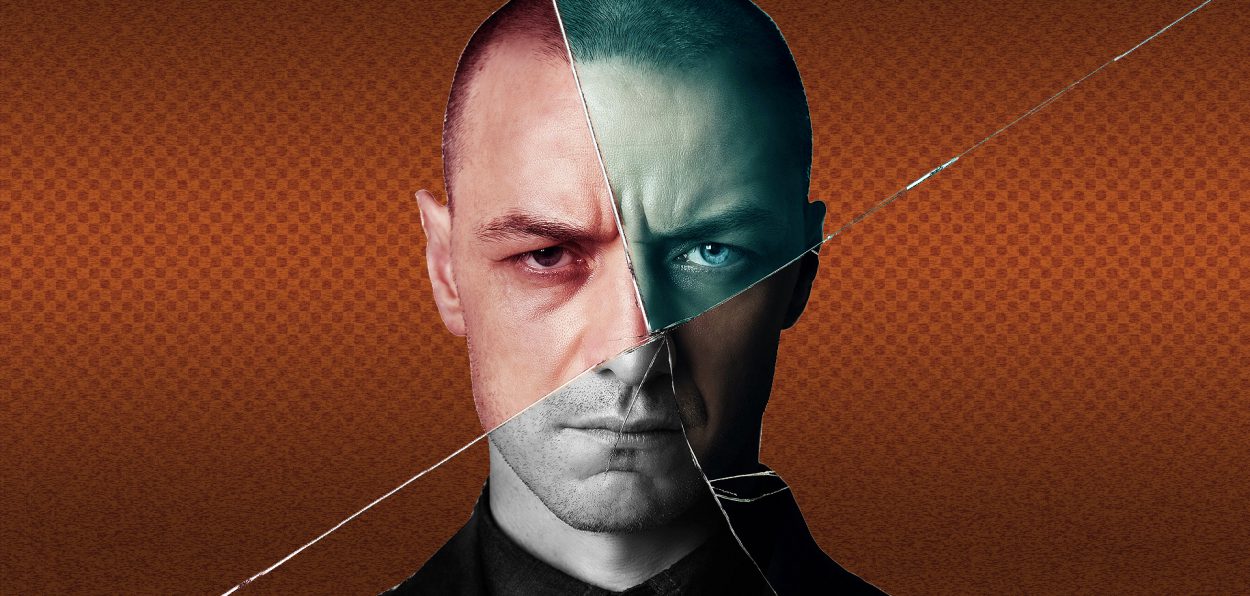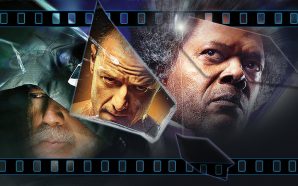Three girls, Claire (Hayley Lu Richardson), Marcia (Jessica Sula) and loner Casey are abducted from a mall, kidnapped by a figure (James McAvoy) who slides into the car and chloroforms them without speaking. They awake in an underground cell, scared by the psychotic man holding them. But their anger and confusion is multiplied when they realise the different voices coming from beyond their cell don’t belong to a group, but their sole abductor – an individual who has many personalities.
As those personalities battle for supremacy, one of them tries to persuade his therapist, Dr. Karen Fletcher, that everything is okay. But as time ticks away, the girls – in particular the enigmatic Casey – must work out a way to play those ‘people’ against each other and contact the outside world. However, if Fletcher’s theory that the personalities are more than just mental coping-devices but actual people with different physical strengths and weaknesses within one body, what will happen if she can’t unite them – and what will happen if she does?
–
We need to talk about Kevin – but from the very earliest previews, the word was – and let’s not miss the irony – divided on whether Split was a return to form for M. Night Shyamalan (the controversial director known for his story-twists) or a continuation in a largely downward spiral of quality in recent years.
There’s no doubt that 1999’s The Sixth Sense was a landmark film – it’s a masterclass in suspense and misdirection and I’ve enjoyed immensely the rare times I get to watch it again with someone who doesn’t know what to expect – a sheer delight to watch that penny drop after a clockwork framework of story ticks away. It was always going to be difficult for the film-maker to surpass that level of critical acclaim, but its immediate follow-up Unbreakable, was a different beast – one with many overlooked qualities, one of the most subtle ‘superhero’ films you’re ever likely to see. In that, Shyamalan – once again teamed with Bruce Wills – deals with a man who cannot be hurt and waxes lyrical on the quirks of evolution.
But Shyamalan, caught in the maelstrom of expectations and disappointing high-concept projects, hasn’t really helped himself either over the years. I asked him once whether he’d be tempted to either let someone else direct his stories or to direct others’ work and he dismissed both ideas of being of little interest. That’s largely been the millstone that’s denied him getting another milestone: he’s often his own worst enemy, taking full control of a good or potentially good idea and getting so wrapped up in how clever that one twist is, that the rest of the film suffers. In The Village, for example, the plot has ludicrous plot-holes that go beyond the somewhat obvious sleight-of-hand everyone spots coming and The Happening takes a compelling ‘what the fuck is going on?‘ apocalyptic pitch and spins out an unsatisfying, threadbare plot to explain it. Add to that a compulsion to make cameos in his own work (in Split he appears in a needless scene as a researcher and lover of Hooters) and it starts to smack of someone embracing the Hitchcock-comparisons a little too eagerly.
While a more streamlined and less cynical film might have been truly effective, Shyamalan once again creates a spaghetti-junction mess of ideas and themes that just don’t sit well together…
Though there are camera techniques and framing devices used to good effect here, especially near the start, this isn’t Shyamalan getting deep and psychological – it’s more him venerating at the altar of potboiler pontif Brain de Palma. Split is an echo of not so much de Palma at his best – which would have been the likes of Carrie, The Untouchables and Carlito’s Way – but the sleazier, down-and-dirty releases such as Dressed to Kill and Raising Cain… the ones that felt like polished versions of well-thumbed pulp fiction novels. And there is a distinct undercurrent of unpleasantness throughout, Shyamalan sneaking around the edges of torture-porn if not embracing it wholesale. The abduction and imprisonment of the three female characters means there’s a necessary evil to show, but the director wants to focus (camera and plot-wise) so much on Taylor-Joy’s Casey that he allows the other two abductees to become little more than fodder…and he becomes obviously bored with their presence after the first act (and you’ll have difficulty remembering their names either).
McAvoy clearly relishes playing a variety of ‘Kevin’s’ personalities and while the tried-and-trusted actor maintains a gleam in his eye throughout, the very nature of the extremes on show always feel like a series of vicious vignettes and performances. I could believe in some of the characters as just that – characters – traits rather than real people …and that’s a serious problem because a great deal of power is lost if you can’t sell them as true individuals merely sharing the same body. To that end, the often unnecessary ‘costume’ changes become silly and distracting.
Anya Taylor-Joy, playing Casey, is making her presence felt, often with somewhat alienated characters. She’s good at the complex bio-engineered ‘Morgan‘ in the horror film of the same name and here her Casey is someone almost comfortable with being uncomfortable, a person coming to terms with her past which we see explored in flashback. Broadway star Betty Buckley also makes an impression as the psychiatrist trying to keep Kevin on an even keel and beginning to be acutely aware that something bad is happening between her scheduled sessions with him.
There will be those annoyed at the exploitative and tabloid way that DID (dissociative identity disorder) is portrayed in the film, but the truth is that while Hollywood loves diseases and medical obstacles it usually prefers to diagnose the legend not the condition… this was never going to be Sybil. While a more streamlined and less cynical film might have been truly effective, Shyamalan once again creates a spaghetti-junction mess of ideas and themes that just don’t sit well together. Frustratingly the result is a creation that feels like a thesis-penning voyeur claiming to have purpose and an insight on abuse but who notably enjoys the research a little too much, coming to a weak and flippant (if familiar) horror genre trope conclusion that what doesn’t kill you makes you stronger.
While a last minute coda gives clues as to what he may want to do as his next project, the result is largely a collision of ideas rather than a convergence
Split has being doing good business since it opened in the US, though the competition hasn’t been fierce and it has fueled rumours that the writer/director might ultimately follow through on his promise to bring a full sequel to Unbreakable to the screen. But the success of that and The Sixth Sense seem like a career-lifetime ago and Split is but a poor relation. It’s merely violent, adequate horror – with genuine moments of suspense but far too many more of contempt, a film that is frighteningly wayward in its intent and nowhere near the sum of its abstract parts.
‘Split‘ is now available on DVD in the UK.
- Story7
- Acting8
- Pacing6
- Box-office potential8









